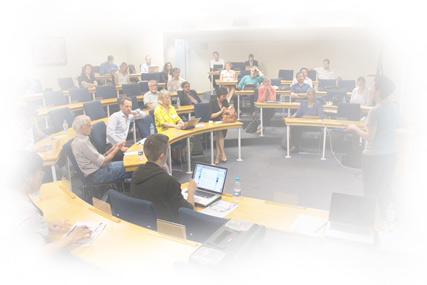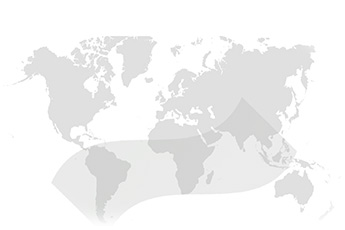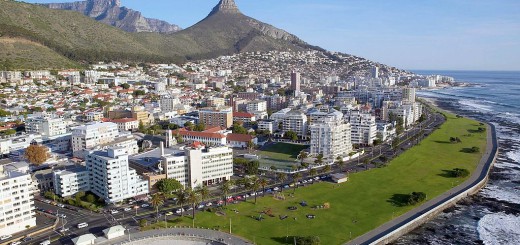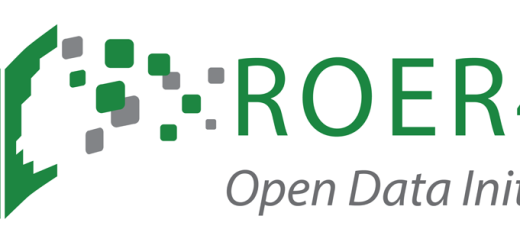
In this post, Henry Trotter discusses how higher education institutions’ varying intellectual property policies affect who should be considered the relevant agent of OER adoption analysis: the lecturers who develop teaching materials or the institutions which (oftentimes) possesses copyright over those materials. The insights shared here were obtained through his research with Glenda Cox as part of ROER4D’s Sub-project 4.
The ability of higher education lecturers to create and share OER is premised on them holding copyright over the teaching materials that they develop. This is because, during the process of sharing their teaching materials openly, they must re-license the materials using an open license standard (e.g. Creative Commons), a process that can only be done legally by the copyright holder.
However, at many (if not most) institutions, lecturers do not possess copyright over the teaching materials that they develop. The institutions – their employers – do. This means that lecturers, who are usually free to incorporate OER into their materials as users, are often unable to share their own teaching materials openly as OER because they have no legal standing to do so.
This issue arose for my colleague, Glenda Cox, and I as we were conducting research on South African lecturers’ attitudes towards OER creation (as part of Sub-project 4 in ROER4D). As we interviewed educators at different universities in the country, one of the key issues defining how the lecturers engaged with OER was whether they held copyright over the teaching materials that they developed, or whether the university did.
As it turns out, even though all 25 South African universities are public state-funded institutions, they each have their own Intellectual Property (IP) policies which provide different prescriptions regarding copyright ownership. These differences determine who can be regarded as the potential “agent” of OER activity at the university: the lecturer or the institution.
At the University of Cape Town (UCT), where we work, lecturers hold copyright over their teaching materials, thus they are free to share them as OER. We initially assumed this was going to be the case at most other national universities. But this was not the case at Fort Hare University and the University of South Africa (UNISA), the two other institutions we researched. Thus we realised that we needed a more complete understanding of the institutional copyright and IP regimes at South African universities if we were to grasp how this particular factor shaped educators’ OER decisions.
IP policies of South African universities
To do this, I reviewed the 25 universities’ IP policies (where possible) and was able to group them into two categories as relates to OER creation. In the lists below, the first group of 5 universities have IP policies that grant copyright over teaching materials with the lecturers themselves. The second group of 20 universities have IP policies that grant the institution copyright over the educators’ work product, including the teaching materials that they have developed. (Click the university’s name to download its IP policy or relevant statement on this issue, if publicly available.)
South African universities which grant lecturers copyright over their teaching materials:
Nelson Mandela Metropolitan University (NMMU)
Rhodes University
University of Cape Town (UCT)
University of Limpopo
University of Venda (UniVen)
South African universities which grant the institution copyright over teaching materials that their lecturers develop:
Cape Peninsula University of Technology (CPUT)
Central University of Technology (CUT)
Durban University of Technology (DUT)
Fort Hare University (FHU)
Mangosuthu University of Technology (MUT)
North West University (NWU)
Sol Plaatje University (SPU)
Stellenbosch University (SU/US)
Tshwane University of Technology (TUT)
University of the Free State (UFS)
University of Johannesburg (UJ)
University of KwaZulu-Natal (UKZN)
University of Mpumalanga (UM)
University of Pretoria (UP)
University of South Africa (UNISA)
University of the Western Cape (UWC)
University of Zululand (UniZulu)
Vaal University of Technology (VUT)
Walter Sisulu University (WSU)
Witwatersrand University (Wits)
While this knowledge was a revelation to us because we work at a university where lecturers enjoy copyright over their teaching materials, we have begun to see that this does not seem to be normal practice. We have learned through conversations with overseas colleagues – both in the Global South and North – that many institutions hold copyright over their lecturers’ teaching materials.
Indeed, in South Africa, national law provides the basis for the institution as copyright-holder being the norm. For instance, many university IP policies refer to the Copyright Act of 1978 which provides the justification for the institution to claim copyright over their “employees’” work product. Section 21(1)(d) states:
Where in a case not falling within either paragraph (b) or (c) a work is made in the course of the author’s employment by another person under a contract of service or apprenticeship, that other person shall be the owner of any copyright subsisting in the work by virtue of section 3 or 4.
Some South African IP policies also refer to the Intellectual Property from Publicly Financed Research and Development Act (or IPR Act) of 2008 which, in section 2, explains that:
(1) The object of this Act is to make provision that intellectual property emanating from publicly financed research and development is identified, protected, utilised and commercialised for the benefit of the people of the Republic, whether it be for a social, economic, military or any other benefit.
Together, these two pieces of legislation grant South African universities automatic copyright possession over the teaching materials that their lecturers create as part of their work. The fact that five universities depart from this legal standard is based on norms, standards and negotiations at those universities which led to them drafting IP policies which, ultimately, granted the lecturers copyright over the teaching materials they created.
Implications for promoting OER creation
This has important implications for the OER movement in general, and for potential OER agents in particular. It suggests that, if we want to promote OER creation, then we need to know who the relevant potential OER agents are for such an activity. If lecturers do not possess copyright over their teaching materials, then it is difficult to exhort them to contribute OER when they have no legal standing to do so. There are ways to change this, of course, such as altering institutions’ IP policies, or encouraging lecturers to ask their institutions for special permission to share their teaching materials as OER. Many universities do, in fact, have processes for lecturers to ask for this type of permission.
The other way to deal with this is to focus interventions on the institutions themselves, to encourage the management to start sharing all of the intellectual property under its ownership as OER. Some of the more successful OER initiatives do precisely this (e.g. MIT’s OpenCourseWare project). But this requires an approach to OER creation and sharing that is different in scope and procedure from that of the individual lecturer. And it means that there is no one-size-fits-all strategy for promoting greater OER creation activities, because each institution’s history, culture and policy landscape will shape how any endeavour proceeds there, sometimes requiring new and unique approaches.
For us, as SP4 researchers in ROER4D, this distinction between the lecturer and the institution as the potential agent of OER creation at a particular site, has allowed us to think differently about how we assess OER adoption. It sits at the heart of our OER Adoption Pyramid, the framework we developed for analysing OER adoption in higher education institutional contexts (see previous blog post). It has also challenged us to think differently about what kinds of recommendations we would share with those who want to promote OER creation in a particular institutional context. It has added greater nuance and precision to our understanding of the policy dynamics shaping OER opportunities in the higher education sector. We hope this small insight will be of value to others embarking on similar OER research.





